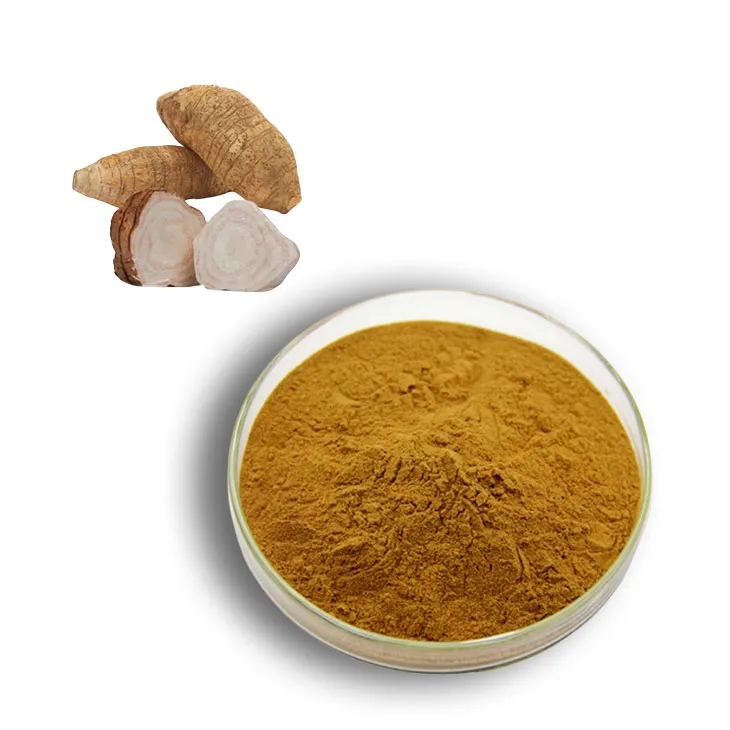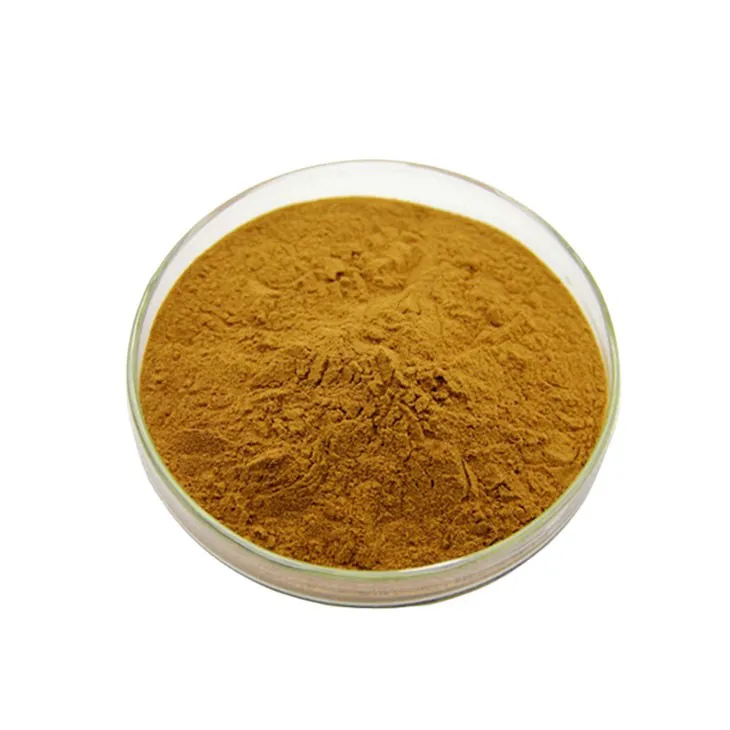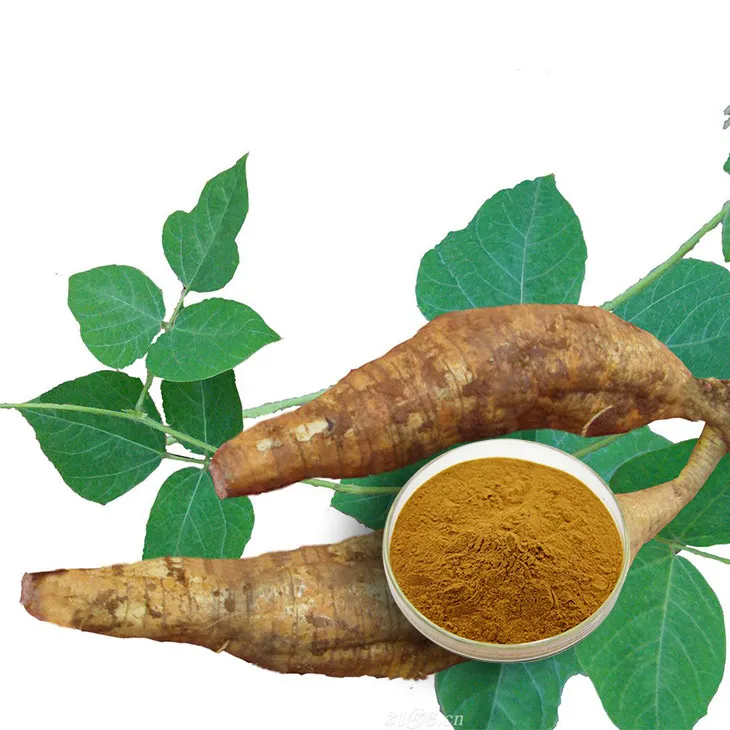- 0086-571-85302990
- sales@greenskybio.com
The Taste of Mature Pueraria lobata and Natural Pueraria lobata Extract.
2024-11-14

1. Introduction
Pueraria lobata, also known as kudzu, has been widely used in traditional medicine and food in many Asian countries. The taste of mature Pueraria lobata and its natural extract are of great interest, not only for their sensory properties but also for their potential health benefits. This article aims to provide an in - depth exploration of these aspects, covering factors influencing the taste of the raw material, the bioactive substances in the extract, quality control in production, and the benefits and side effects of using the extract.

2. The Taste of Mature Pueraria lobata
2.1 Factors Affecting the Taste
The taste of mature Pueraria lobata can be significantly influenced by several factors during its growth process. Soil is one of the crucial factors. Different soil compositions can lead to variations in the nutrient uptake of Pueraria lobata. For example, soil rich in potassium may contribute to a sweeter taste, while soil lacking certain micronutrients might result in a more astringent or bitter taste.
Climate also plays an important role. In areas with a warm and humid climate, Pueraria lobata may grow more vigorously, and the taste may be affected accordingly. High humidity might promote the development of certain flavors, while excessive heat or cold during the growth period could potentially alter the normal taste formation.
Cultivation techniques are another aspect to consider. Appropriate irrigation, fertilization, and pest control methods can impact the quality and taste of Pueraria lobata. Over - fertilization may lead to an imbalance in the plant's metabolism, which could be reflected in an abnormal taste.
2.2 Taste Characteristics
Generally, mature Pueraria lobata has a complex taste profile. It often has a slightly sweet flavor, which is accompanied by a certain earthy or herbal note. Some people may also detect a faint bitterness or astringency, especially if the plant has been exposed to less - than - ideal growing conditions. The texture of Pueraria lobata can also influence the overall taste perception. When consumed raw, it can be fibrous, which may add a unique chewiness to the taste experience. When cooked, the texture becomes softer, and the flavors are often more concentrated and harmonious.

3. Natural Pueraria Lobata Extract
3.1 Bioactive Substances
The natural Pueraria Lobata Extract is rich in various bioactive substances, which are of great significance for its potential health - promoting effects. Flavonoids are one of the major components. These compounds are known for their antioxidant properties. They can help protect the body's cells from oxidative damage caused by free radicals. For example, some flavonoids in Pueraria Lobata Extract can scavenge reactive oxygen species, reducing the risk of chronic diseases such as cardiovascular diseases and certain cancers.
Isoflavones are another important group of bioactive substances in Pueraria lobata extract. Isoflavones have a structure similar to estrogen, and they are often referred to as phytoestrogens. They can interact with estrogen receptors in the body, which may have beneficial effects on hormonal balance. In women, for instance, isoflavones may help relieve menopausal symptoms by mimicking the action of estrogen to a certain extent.
3.2 Production and Quality Control
The production process of Pueraria lobata extract is complex and requires strict quality control. First, the selection of high - quality raw materials is essential. Only mature and healthy Pueraria lobata should be used for extraction. The extraction method also affects the quality of the extract. Different extraction solvents and techniques can lead to variations in the composition and concentration of bioactive substances. For example, using ethanol as an extraction solvent may result in a different profile of flavonoids and isoflavones compared to water extraction.
During the production process, quality control measures should be implemented at every stage. This includes monitoring the purity of the raw materials, controlling the extraction conditions such as temperature, pressure, and time, and ensuring the proper purification and concentration of the extract. Any deviation from the optimal production conditions may lead to a decrease in the quality of the extract, which could affect its taste and bioactivity.

4. Comparison between the Taste of the Raw Material and the Properties of the Extract
The taste of the raw Pueraria lobata and the properties of its extract are related but also have distinct differences. The extract often has a more concentrated flavor compared to the raw material. This is because the extraction process concentrates the bioactive substances and other flavor - contributing components. For example, the sweetness in the extract may be more pronounced if the extraction process has selectively concentrated certain sugars or sweet - tasting compounds present in Pueraria lobata.
However, the extraction process may also introduce some changes in taste. Some volatile compounds may be lost during extraction, which could potentially affect the overall flavor profile. Additionally, the presence of extraction solvents or by - products may add new flavors or odors to the extract. In terms of properties, while the raw Pueraria lobata contains a variety of substances in their natural state, the extract is more refined and targeted in terms of its bioactive components. This difference emphasizes the importance of quality control in the production process to ensure that the desired properties of the extract are maintained while minimizing any negative impacts on taste.
5. Potential Benefits of Using Pueraria lobata Extract
There are several potential benefits associated with the use of Pueraria lobata extract. As mentioned earlier, its antioxidant properties due to the presence of flavonoids can contribute to overall health. By reducing oxidative stress, it may help improve the function of various organs in the body. For example, it may support liver health by protecting liver cells from damage.
The phytoestrogenic effect of isoflavones in the extract may have implications for hormonal health. In addition to relieving menopausal symptoms in women, it may also play a role in maintaining bone density. Some studies suggest that isoflavones can inhibit bone resorption, which is beneficial for preventing osteoporosis.
Furthermore, Pueraria lobata extract may have anti - inflammatory properties. Chronic inflammation is associated with many diseases, and the anti - inflammatory components in the extract may help reduce inflammation in the body. This could potentially be beneficial for conditions such as arthritis or inflammatory bowel diseases.
6. Possible Side Effects of Using Pueraria lobata Extract
While Pueraria lobata extract has many potential benefits, it is also important to be aware of possible side effects. One concern is related to its phytoestrogenic effect. In some cases, excessive intake of phytoestrogens may disrupt the body's hormonal balance, especially in individuals with pre - existing hormonal disorders. For example, men may experience a decrease in testosterone levels if they consume large amounts of Pueraria lobata extract over a long period.
Some people may also be allergic to Pueraria lobata or its extract. Allergic reactions can range from mild skin rashes to more severe symptoms such as difficulty breathing or anaphylactic shock. Therefore, it is advisable for individuals with a known allergy to Pueraria lobata to avoid using the extract.
Moreover, the use of Pueraria lobata extract should be cautious during pregnancy and breastfeeding. Although there is not enough conclusive evidence regarding its safety in these situations, the hormonal - modulating effects of the extract may pose a potential risk to the fetus or the nursing infant.
7. Conclusion
In conclusion, the taste of mature Pueraria lobata and its natural extract are influenced by multiple factors, and they are closely related to the plant's growth conditions and the extraction process. The natural Pueraria lobata extract contains valuable bioactive substances such as flavonoids and isoflavones, which offer potential health benefits. However, it is also necessary to be aware of the possible side effects associated with its use. Quality control in the production process is crucial to ensure that the extract maintains its desired properties while minimizing any negative impacts on taste. This comprehensive understanding of Pueraria lobata and its extract can provide valuable information for consumers, producers, and researchers interested in this plant - based product.
FAQ:
What factors can influence the taste of mature Pueraria lobata?
Soil, climate, and cultivation techniques are the main factors that can influence the taste of mature Pueraria lobata. Different soil types can provide different nutrients, which may affect the growth and flavor of the plant. Climate, such as temperature, humidity, and sunlight exposure, also plays a role. Additionally, cultivation techniques like watering, fertilization, and pest control can impact the taste of Pueraria lobata.
What are the main bioactive substances in natural Pueraria lobata extract?
The main bioactive substances in natural Pueraria lobata extract are flavonoids and isoflavones. These substances are known for their potential health benefits, such as antioxidant, anti - inflammatory, and estrogen - like effects.
How does the taste of the raw material of Pueraria lobata compare to the properties of its extract?
The taste of the raw material of Pueraria lobata can be quite different from the properties of its extract. The raw material may have a more earthy and natural taste, while the extract may be more concentrated in its bioactive substances. The extraction process can also modify the chemical composition, leading to different properties. For example, the extract may have stronger antioxidant or anti - inflammatory effects compared to the raw material.
Why is quality control important in the production process of Pueraria lobata extract?
Quality control is crucial in the production process of Pueraria lobata extract because it ensures the safety and effectiveness of the product. Without proper quality control, the extract may contain impurities, contaminants, or inconsistent levels of bioactive substances. This can lead to potential health risks or reduced efficacy. Quality control measures include raw material sourcing, extraction methods, purification, and final product testing.
What are the potential benefits of using Pueraria lobata extract?
The potential benefits of using Pueraria lobata extract include antioxidant, anti - inflammatory, and estrogen - like effects. It may also have potential benefits for cardiovascular health, bone health, and menopausal symptoms. However, more research is needed to fully understand these benefits and to determine the appropriate dosage and usage.
What are the possible side effects of using Pueraria lobata extract?
Some possible side effects of using Pueraria lobata extract include gastrointestinal discomfort, such as nausea, vomiting, and diarrhea. In addition, it may interact with certain medications, so it is important to consult a healthcare provider before using it. Pregnant and breastfeeding women should also avoid using Pueraria lobata extract due to potential risks to the fetus or infant.
Related literature
- Title: The Bioactive Compounds and Health Benefits of Pueraria lobata"
- Title: "Quality Control in the Production of Natural Plant Extracts: A Case Study of Pueraria lobata"
- Title: "The Taste and Flavor Profile of Pueraria lobata: A Comprehensive Review"
- ▶ Hesperidin
- ▶ Citrus Bioflavonoids
- ▶ Plant Extract
- ▶ lycopene
- ▶ Diosmin
- ▶ Grape seed extract
- ▶ Sea buckthorn Juice Powder
- ▶ Fruit Juice Powder
- ▶ Hops Extract
- ▶ Artichoke Extract
- ▶ Mushroom extract
- ▶ Astaxanthin
- ▶ Green Tea Extract
- ▶ Curcumin
- ▶ Horse Chestnut Extract
- ▶ Other Product
- ▶ Boswellia Serrata Extract
- ▶ Resveratrol
- ▶ Marigold Extract
- ▶ Grape Leaf Extract
- ▶ New Product
- ▶ Aminolevulinic acid
- ▶ Cranberry Extract
- ▶ Red Yeast Rice
- ▶ Red Wine Extract
-
Marigold Extract
2024-11-14
-
Diosmin
2024-11-14
-
Passionflower Extract
2024-11-14
-
Lotus leaf extract
2024-11-14
-
Maca Extract
2024-11-14
-
Beta Carotene
2024-11-14
-
Angelica sinensis extract
2024-11-14
-
Uridine-5'-monophosphate Disodium salt
2024-11-14
-
Fig Extract
2024-11-14
-
Green coffee bean Extract
2024-11-14





















